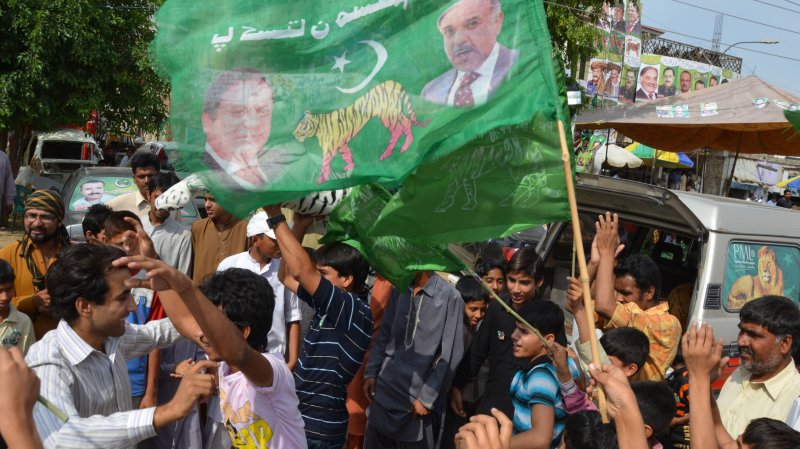1 of 6 | PAKISTAN,RAWALPINDI : Supporters of former Pakistani prime minister and head of the Pakistan Muslim League-N (PML-N), Nawaz Sharif, celebrate the victory of their party a day after general elections, in Rawalpindi Pakistan on May 12, 2013. UPI/Sajjad Ali Qureshi |
License Photo
ISLAMABAD, May 13 (UPI) -- Nawaz Sharif was set Monday to lead Pakistan after his party seemed to have won the most seats in elections marking Pakistan's first democratic power transfer.
After the weekend elections marred by violence that claimed more than 20 lives, Sharif, 63, a two-time prime minister, claimed victory with unofficial results showing his Pakistan Muslim League-N Party had secured 125 of the 272 directly elected seats in the National Assembly, the lower house of Parliament.
U.S. President Barack Obama, in his congratulatory message released by the White House, said the United States "stands with all Pakistanis in welcoming this historic peaceful and transparent transfer of civilian power, which is a significant milestone in Pakistan's democratic progress."
Pakistan has been a partner with the United States in the fight against terrorism but relations between the countries have been rocky as critics in Washington have questioned Islamabad's commitment in the anti-terrorism effort.
Sharif, an industrialist-turned-politician who was ousted in 1999 during his second term as prime minister in a military coup led by Pervez Musharraf, is expected to be sworn in as prime minister for the third time this week as his PML-N party is expected to win support of smaller parties to form the government even if it doesn't end up with a majority on its own.
Besides the 272 directly elected seats in the National Assembly, 70 seats are reserved for women and minority candidates nominated by parties, bringing the total strength to 342.
Dawn newspaper quoted PML-N information secretary Mushahidullah Khan as saying the party wants to form the government soon to tackle the country's numerous problems.
Those challenges include militant and sectarian violence that have claimed thousands of lives in recent years, an extremely weak economy, massive power outages and major foreign policy hurdles, chief among them being relations with the United States and neighboring India.
India and Pakistan are nuclear-armed countries whose relations remain tense due to terrorism.
Khan told Dawn his party hopes to secure a majority of 172 seats in the 342-member National Assembly once the final election results are officially announced in the coming days.
PML-N is also expected to lead the provincial government in Punjab province, the home of Sharif and which account for more than half of the assembly seats.
Since its founding in 1947, Pakistan has been ruled intermittently by the powerful military. The previous coalition civilian government, led by President Asif Ali Zardari's Pakistan People's Party, became the first to complete its full five-year term in March, paving the way for the current elections. Turnout at Saturday's elections was about 60 percent despite violence and threats of attacks by the Taliban.
Zardari's party, hobbled by charges of poor governance, corruption, rising prices and letting the economy plunge, fared poorly in the vote, securing fewer than 35 seats.
Sharif had been prime minister from November 1990 to July 1993 and from February 1997 to 1999 when he was ousted in the coup. It was during his term that Pakistan conducted its first nuclear test in 1998.
The Wall Street Journal reported Sharif's victory shifts the balance of power from the military that ousted him.
"Nawaz Sharif will have a strong government, so he can make his own policies," Wasim Sajjad, a former interim president of Pakistan, told the Journal.
In a post-election interview with the Journal, Sharif expressed confidence of reaching agreement with the United States on controversial issues. He said Pakistan's relations with the United States were "good when I was in power" and that he would like to further strengthen them.
Sharif also said Pakistan needs good relations with Afghanistan, whose President Hamid Karzai remains a critic, accusing Pakistan of sponsoring the Taliban insurgency in his country, the Journal reported.
Sharif also told the Journal Pakistan needs warmer ties with India.
A Christian Science Monitor editorial said: "For too long, Pakistan has been a leading example of a failing state. It has challenged the very notion of progress for all humanity. Name a world woe -- religious terror, military coups, endemic illiteracy, nuclear proliferation, power blackouts, aid dependency -- and Pakistan has likely been home to it. But after a remarkable election Saturday, a country of despair that has been nearly ungovernable may now be more one of hope."















